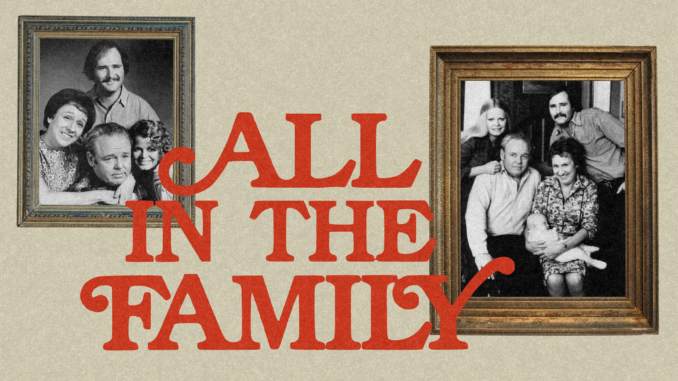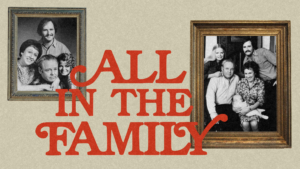
In 1971, All in the Family burst onto television screens and did what no sitcom had ever dared to do: it threw society’s most uncomfortable issues into the spotlight, unfiltered and unapologetic. From racial tension to gender inequality, from Vietnam War protests to the changing roles of women, the show fearlessly tackled it all. But beneath the surface of its groundbreaking humor was something far more complicated: while All in the Family was designed to mock bigotry, it ended up inadvertently giving it a platform.
The ’60s were an era of chaos and change in America. The Vietnam War, the Civil Rights Movement, the assassinations of iconic leaders like John F. Kennedy and Martin Luther King Jr., and the rise of countercultures filled the airwaves, but TV largely ignored these seismic shifts. Instead, viewers were served up sanitized versions of reality—wholesome comedies like The Andy Griffith Show and The Beverly Hillbillies, where problems were always solved by the end of the episode and deep societal issues were nowhere to be found.
Enter All in the Family, a sitcom that broke this mold and changed television forever. At its heart was Archie Bunker, a middle-aged, working-class man with a razor-sharp tongue and a treasure chest of prejudices. Played by Carroll O’Connor, Archie was a loud-mouthed, often bigoted character who voiced his thoughts on everything from women’s rights to racial integration, often using terms and ideas that many considered outdated or downright offensive. The show’s audacity was shocking—but it was also brilliant.
Unlike the idealized worlds of earlier sitcoms, All in the Family didn’t shy away from the raw reality of American society. Episodes like The Draft Dodger and Gloria Discovers the Women’s Lib forced viewers to grapple with issues they usually avoided. The family’s frequent debates—between the conservative Archie, the progressive son-in-law Mike, and the blissfully naive Edith—mirrored the broader cultural clashes of the time. It wasn’t just comedy; it was a reflection of a country divided.
Yet, despite the show’s clear intentions to satirize bigotry, it’s hard to ignore the uncomfortable truth: Archie became a hero to many of the very people the show sought to critique. His crass, sometimes hateful rants struck a chord with viewers who felt disenfranchised by the rapid changes in the country. These were the same people who proudly displayed bumper stickers that read “Bunker for President” and who saw Archie not as a cautionary tale, but as a voice of reason.
While creator Norman Lear hoped to encourage viewers to question Archie’s views, many conservative fans embraced them wholeheartedly. Studies showed that these viewers didn’t recognize the show’s satire; instead, they saw their own beliefs reflected back at them. For them, Archie wasn’t the joke—he was the truth-teller, the everyman speaking out against a changing world they didn’t understand.
In this way, All in the Family became a double-edged sword. It challenged the status quo, but it also normalized some of the worst elements of American culture. Critics like Laura Z. Hobson argued that presenting Archie as a lovable, flawed character risked softening the blow of his prejudices, making them seem more palatable. And as the years went on, Archie’s legacy lived on—not just in the sitcoms that followed, but in the attitudes of those who saw him as a champion of their own narrow worldviews.
Ironically, All in the Family did more than just reflect the world—it shaped it. It opened the door for more socially conscious programs that explored race, gender, and politics, but it also paved the way for shows that celebrated the very bigotry it tried to expose, like Married… with Children. In the end, the character of Archie Bunker remains a powerful symbol of how television can shape—and be shaped by—the culture around it.
Today, Archie’s influence is perhaps more apparent than ever. As America grows more divided, there’s a sense that Archie’s spirit lives on in those who feel emboldened to voice their most controversial opinions, no matter how hurtful they may be. The difference now is that, unlike in Archie’s time, these opinions are often no longer confined to fictional characters—they’re being aired on public platforms by real people, from politicians to social media influencers.

So, what did we learn from All in the Family? That even a show designed to ridicule bigotry can give it new life. That satire can backfire, and what we think we’re laughing at might actually be what we’re learning to accept. And perhaps most alarmingly, that sometimes the most outrageous voices on television become the loudest—and the most dangerous—ones in real life.
As we look back on the legacy of All in the Family, it’s clear that the show’s cultural impact is still being felt today. Whether it’s a sign of progress or a warning about the power of media, one thing is certain: the Bunker family may have gone off the air in 1979, but their influence is far from over.
